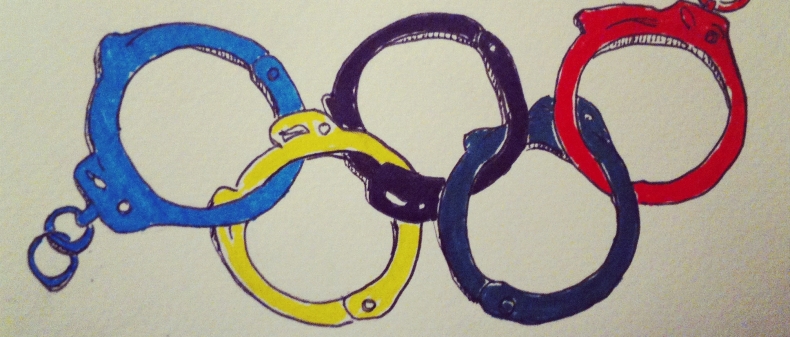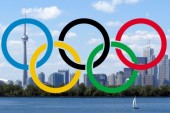
Illustration by Tiffy Thompson
Turns out the Olympics are a bona fide sex haven for athletes, but the conversation may be detracting from an international crisis hidden beneath the surface of mass sporting events. While athletes may be anticipating post competition sexcapades (American soccer gold-medalist Hope Solo told ESPN magazine that she’s “seen people having sex in the open. On the grass, between buildings, people are getting down and dirty.”), the issue of human trafficking has once again reared its ugly head as we wind down to Friday’s opening of the London Summer Games.
Human trafficking at major sporting events including the Olympics, the World Cup and the Super Bowl has been escalating since 2004, when sex trafficking at the Athens Olympics first became an issue, according to UK NGO Stop the Traffik, who advocates awareness for the cause. There is concern that these are myths, simply fear tactics that drive the cost of major sporting events up exponentially.
However, human trafficking issues are so severe that in 2000, the United Nations introduced the Protocol to Prevent, Suppress and Punish Trafficking in Persons, especially Women and Children. One hundred and seventeen countries including Canada and the United Kingdom have signed to date. Human trafficking is the second largest global criminal industry, preceded only by drug trafficking, raking in tens of billions of dollars per year. Sexual exploitation is the most common form of human trafficking, representing 79 per cent of all slavery.
Concern over London in particular stems largely from the basis that Europe is the largest destination for human traffickers. In a short documentary on human trafficking and the Olympics produced by Bournemouth University, it was said women can be sold for between 500 and 8,000 pounds — or $780 to $12,600 Canadian. They’re often forced to work for 16 hours at a time and sometimes servicing tens of men a day.
Women are threatened and forced into the sex trade, with increased numbers being brought into cities during these times. They’re forced into drugs and often abused by their captors without medical aid. In the documentary, an escaped victim tells the interviewer she would “prefer to die than continue to live like this.”
It is predicted the Olympics will cause an increase in human trafficking and sex exploitation in London.
In 2010, British Liberal Democrat Annette Brooke passed an early day motion recognizing that “4,000 people had been trafficked into the UK to work as prostitutes,” and that there is concern that the “advertising of sex for sale increases greatly when large numbers of tourists gather together for sporting events such as the Olympics.”
It is feared that the increase of young male visitors and increased trading results in higher demand for prostitutes and cheap labour, something organizations in the UK such as the Purple Teardrop Campaign are trying to not only raise awareness of, but prevent.
“We’re being been told that there’s training going on with the police and front line workers, but we’re also getting requests for help. We’re not sure that the government are actually taking the right precautions,” Penny Bartless from the Purple Teardrop Campaign told Bournemouth University regarding Friday’s Olympics.
The entire documentary can be watched in the video below.
The documentary also devolves that there really is no proof that sporting events increase the numbers of human trafficking or just draw attention to and awareness of the numbers, which is in stark contrast to articles published here in Canada.
These concerns are not unique to international incidents, and were alive and well during the Vancouver Games in 2010. An article by the Vancouver Observer reported, “Winn Blackman, from the Salvation Army, revealed that human traffickers have already been here in Vancouver for at least one year. They view the 2010 Vancouver Olympics as the biggest opportunity for them in decades.”
The Women’s Memorial March is held each year in Vancouver to raise awareness for the hundreds of murdered and missing women, many who were prostitutes. It started two decades ago with the brutal murder of a Coast Salish woman and continued with significant force during recent years with high profile serial killer Robert Pickton. The Observer reports that 3,000 women have been murdered or gone missing since the 1970s. On the second day of the Vancouver Games, hundreds of people participated in the march but little coverage seeped into the Olympic festivities.
According to the Washington Times, the Super Bowl is considered the largest human trafficking event in the United States and possibly the world. Children are frequent prey. The Times warned parents to protect their children and escort them everywhere during the Super Bowl. But it was the World Cup in 2010 that heightened concerns over human trafficking at sporting events, not only for an increased numbers of prostitutes but also an increase in the number of new victims. This story by ESPN offers a disturbing look into the various crimes and abuses that happen to the victims — and how difficult it is change this.
While it sounds like something from a Liam Neeson movie, human trafficking at sporting events is a very real issue that hides behind the spectacle and fades into the background behind shiny gold medals.
____
Sheena Lyonnais is Toronto Standard’s Tech and Business Editor. You can follow her on Twitter at @SheenaLyonnais.
For more, follow us on Twitter @TorontoStandard or subscribe to our newsletter.














